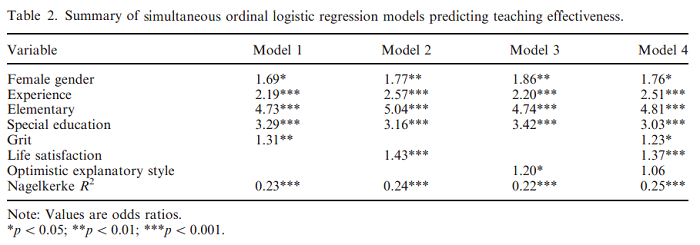There might be affiliate links on this page, which means we get a small commission of anything you buy. As an Amazon Associate we earn from qualifying purchases. Please do your own research before making any online purchase.
Teaching difficult students can be taxing – suggesting that emotional health and perseverance (e.g. grit) may predict teacher performance in poor neighborhoods.
In this study, Teach For America teachers, who are required to teach in mostly poor neighborhoods, were assessed for 4 qualities: grit, life satisfaction, optimism, and performance.
Performance was objectively assessed by averaging the academic gains of their students.
Although life satisfaction was the most powerful of the three qualities for predicting performance, teachers one standard deviation higher in grit were 31% more likely to outperform their peers.
Sadly, on average, life satisfaction decreased from year 1 to year 2 – teaching in poor neighbors can take its toll.
Click here to learn more about grit.
Study Details
Hypothesis: Grit, life satisfaction, and optimistic explanatory style each independently predicts teacher performance and Teach For America teachers are higher than others their age on all three of those traits.
Method: 390 Teach For America teachers completed a number of questionnaires, which were then compared against teacher performance.
Measures: 3 factors were compared against performance.
Teachers completed three self-report questionnaires, which measured grit, life satisfaction, and optimistic explanatory style.
Rankings of teacher effectiveness were constructed by Teach For America administrators according to the academic gains of the teachers' students. Administrators estimated grade-level gains, average student mastery of educational content goals, or both.
Results: The hypothesis was partially confirmed.
All three traits predicted performance: teachers one standard deviation higher in grit, life satisfaction, or optimistic explanatory style were respectively 31%, 43%, and 20% more likely to outperform their peers.
In a simultaneous ordinal logistic regression model predicting effectiveness, only grit and life satisfaction were distinctly predictive.
Teach for America teachers rated on average 10 to 30% higher on the traits than other, more diverse samples.
Second-year teachers were less satisfied with their lives than first-year teachers – Teach For America is tough!
Concerns: The results may not be generalized, as the sample contains graduates of mostly prestigious universities, most of whom have no formal training in education.
Questions: Can grit be trained? Does grit pass through from teacher to student, or is the influence more genetic or through family environment? Would life satisfaction continue to decline, as teachers continued to be stressed by their job? Was there a relationship between grit and the decline in life satisfaction?
Full study here.
Duckworth, A. L., Quinn, P. D., & Seligman, M.E.P. (2009). Positive predictors of teacher effectiveness. Journal of Positive Psychology, 19, 540-547.

